Here are the most noteworthy stories we came across in the past seven days…
SUV as crowd control weapon: This time it was in Detroit where a police SUV was surrounded by protestors and then the officer at the wheel decided to floor it and ram through them. Several people were seriously injured.
Nothing to see here: The NYPD looked into a case of officers driving into protestors last week and found that they did not violate use of force policies.
Traffic is back: Our wonderful flirtation with quieter, calmer streets is all but over as driving volumes are pretty much back to pre-Covid levels.
Sporting TDM: Mr. Donald “High Cost of Free Parking” Shoup argues that all major sporting events should come with free transit passes in order to cut down on driving trips.
Oppressive interstates: Portland knows this story very well, but it’s L.A.’s freeways that got major attention this past week for being “insidious monuments to racism and segregation.” (And PBOT and ODOT want to double-down on this racist history in the Rose Quarter.)
Advertisement
Bike touring amid Covid: The LA Times says bike touring could be the hot ticket this summer for people who fear the virus but still want to hit the open road.
Case closed: A year after Robyn Hightman was killed while bicycling in New York City, Bicycling’s Peter Flax takes a deep dive into the troubling police investigation that blames them for their death.
This is how you do it: A suburban city just beyond the Oakland/SF area is getting rave reviews for its Dutch-style protected intersection.
Transportation is a racism issue: Solid overview from Politico opinion writer about how transportation in America is so closely tied to the fight for racial justice and how the current infrastructure bill being debated on Capitol Hill could help set us on a new path.
Cycling and socialism are popular: Paris Mayor Anne Hidalgo has unabashedly ran on a platform of transforming streets into cycleways and fighting climate change and she just won re-election.
— Jonathan Maus: (503) 706-8804, @jonathan_maus on Twitter and jonathan@bikeportland.org
— Get our headlines delivered to your inbox.
— Support this independent community media outlet with a one-time contribution or monthly subscription.



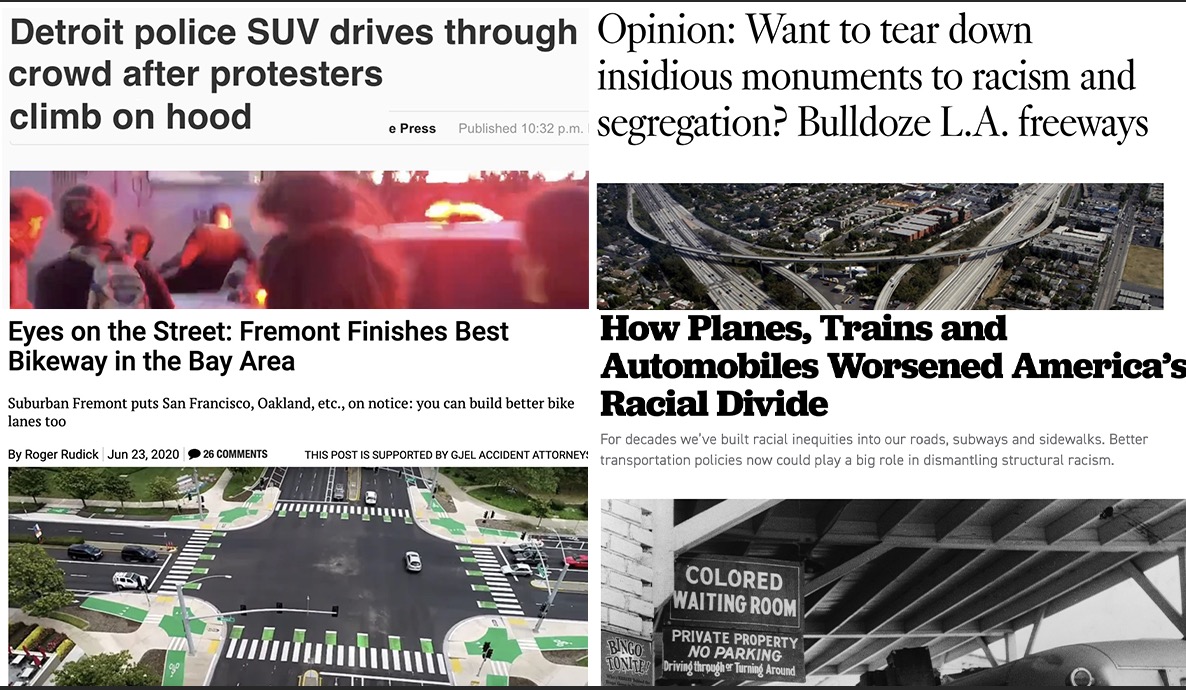
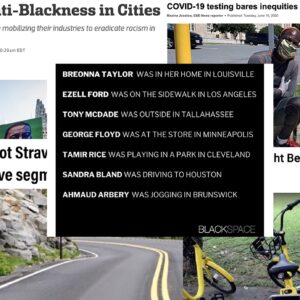
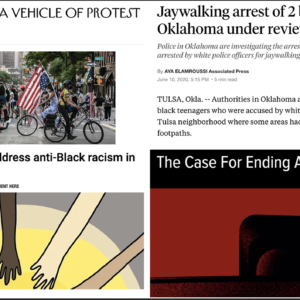
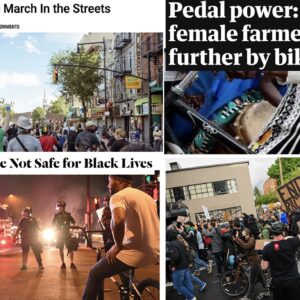
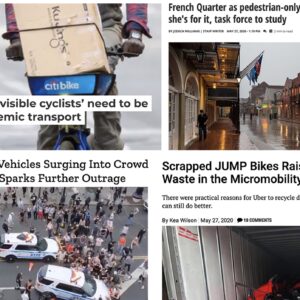
Thanks for reading.
BikePortland has served this community with independent community journalism since 2005. We rely on subscriptions from readers like you to survive. Your financial support is vital in keeping this valuable resource alive and well.
Please subscribe today to strengthen and expand our work.
Another monument to racism we should consider what to do with: historic preservation districts. Whose history are we preserving? What are we celebrating? Irvington, Ladd’s, Kenton, and Laurelhurst are only what they are because of who they excluded; the elevation of Irvington, Ladd’s, and Laurelhurst (and other blue- and green-lined neighborhoods, even if they have not yet acquired historic preservation protection) could not have happened without the caging, debasement, blighting, plunder, and demolition of Albina and other parts of Portland. Don’t the protections afforded by a historic district designation (and specifically those against higher density and more affordable housing) not only celebrate the spoils of redlining but continue its work? If not in intent, certainly in actual impact. To be clear, I’m not advocating for tearing anything down in these neighborhoods. However, I don’t think their legacy should be celebrated and protected by the government.
Seriously. We’re theoretically able to celebrate the preservation of history in those other neighborhoods because none of them suffered from anything like the devastating development of shopping malls and hospitals and freeways and sports arenas (practically falling from the sky like bombs) that Albina was subjected to.
Too bad the King Building’s not around anymore to be celebrated or preserved.
ps, Comment of the Week?
Like they say on Code Switch podcast, housing segregation touches everything.
So does login/subscriber segregation. None of us non-subscribers can give this or any other remark a thumbs up or down, we can only comment. A bit like being able to reply to an opinion poll but not being able to vote in an election (or vice versa?)
Fine by me. I don’t find the up/downvoting to be particularly helpful.
Why not become a subscriber? At $10./month, this is a small amount to support such an important business.
Downvote.
Is the byline of BikePortland.org “to inform and inspire”, or is the buy-line “to make money”?
It’s got to make money, or it cannot continue to inform. It’s a sad truth, but that’s how life works.
Glisan Street should be zoned for mult-story mixed development for its entire length. Laurelhurst school is very popular (people even cheat and lie to get their kids in there), so I could definitely see a market for multi-family housing close to the school. We should be embracing these walkable neighborhoods with high-quality schools by allowing more residents to live within walking distance.
Upvote.
The East Portland sections of Glisan are already upzoned and have several medium and high density apartment buildings along it near the Menlo Park (DDSD) and Glenfair (RSD) elementary schools, which also abut Glisan.
A couple of entries in the local discussion around a historic district designation for Eastmoreland from a few years back.
Call.
Response.
Neither really touch on the fact that that celebrating and protecting historically exclusionary neighborhoods that have architecture some people enjoy might be problematic for similar reasons celebrating a Confederate general who some thought was a good leader of soldiers is problematic—both usually plaster over the fact they achieved their acclaim whilst and by upholding the disenfranchisement of people of color and specifically Black Americans. In this discussion, participants seem more worried about calling someone else a racist or being called a racist. Only one of them calls attention to the impact a historic designation might have (to continue and exacerbate the exclusionary nature of the neighborhood) instead of what might have been intended with the designation. The other replies: but look at these other things we are doing—we are not racists!
Impact, not intent.
One of the best architectural essays I’ve ever read was written by an architect in a book from the 1920s, where he discussed which styles from the past that he admired. He lamented people looking at palaces like Versailles and saying, “What beauty! Why can’t people build beautiful buildings like that today?” His answer was that when HE looked at Versailles, he saw a building that was financed with slavery in foreign countries that France had invaded, construction done by people forced to work until they died from malaria in the French swamps, an owner/king financed by subjugation of his subjects, etc. He said we COULD build those palaces today if we returned to slavery, royalty, serfdom, etc. but of course we shouldn’t.
Your comments about historic districts remind me of that. They also remind me of similar commments about “Why can’t we have buildings like that today?” in reference to the Chrysler Building or other architectural gems of the 20s and 30s. We COULD have more of those today if say, we eliminated the income tax.
The point is that when looking at fine buildings or neighborhoods from the past, you do have to go beyond the architecture, and look at how they came into being. And if you do, it’s not all pleasant, which I appreciate your bringing up.
Thank you for this added context, qqq. I didn’t realize this intellectual strand stretched back to at least the 1920s.
We could easily afford to build buildings like the Chrysler building now; it’s architectural choice, not financial limitations that stop us from doing that.
Upvote
I am laughing here at the forced comment-voting taking the voting out of the anonymous shadows and into the username light.
big ol’ upvote.
And so the snarkiness begins…
What is it that seems snarky to you exactly?
Phil voted up because he, like myself, cannot log in. 9watts makes fun of the need of Phil to write “upvote”. Whether 9watts meant to or not, his comment effectively shames anyone else from doing the same thing, which kills any further discussion. To me, as another person who cannot log in, I find that 9watts’ remark is both snarky and humiliating.
upvote
And lo! By actually commenting, something constructive that 9watts can actually chew on comes forth.
And he uses that opportunity to make a snarky and unuseful remark. And he’s hardly the only one. I dare say that I myself will so do the same, if I haven’t already.
I didn’t find 9watts’ comment either snarky or shaming, or I wouldn’t have “upvoted” it. I also am unable to login and do the voting thing, but I’m ok with it. If nothing else, this looks more like a conversation to me than if everyone was just clicking “up” and “down”.
“9watts makes fun of the need of Phil to write “upvote”.”
Jumped the shark? Is that the phrase I am looking for? David, Please! I was not making fun of Phil, I was laughing at the convoluted trajectory of the up, down, sideways, pay-per-view voting roller coaster we have seen here lately. I thought the comment-as-upvote brilliant and subversive.
I wish you wouldn’t be so sure of yourself in ‘knowing’ what my comment signified, And I’m sorry that writing what I did apparently left open the possibility that I was being snarky, never mind humiliating(!)
“Don’t the protections afforded by a historic district designation (and specifically those against higher density and more affordable housing) not only celebrate the spoils of redlining but continue its work? ”
That is a really interesting (and to me knew) perspective. Thank you for shaking things up. I am. it sure I agree but I am going to have to think about this.
and rain panther’s comment:
“We’re theoretically able to celebrate the preservation of history in those other neighborhoods because none of them suffered from anything like the devastating development of shopping malls and hospitals and freeways and sports arenas (practically falling from the sky like bombs) that Albina was subjected to.”
is making a different but related point. This one is more intuitive to me, but maybe that reflects my own biases.
It’s an interesting idea. But what about districts like the N. Russell St. or Eliot or N. Mississippi Conservation Districts? Or the New Chinatown/Japantown Historic District? Those are different in many ways than the areas you mentioned that were tony and segregated.
I’d also say what about adding historic status to places like N. Williams Ave. The problem with that idea, though, is that most of what would be worth preserving is gone.
You bring up a good point; I should have specified the type of historic districts I think are problematic: those that have enjoyed continuous exclusionary protections—from explicitly racist deeds; to explicitly racist financing; to zoning effective and intended to keep people of color out; to the protection of the 1977 Population Strategy that provided new justification and mandate for that exclusion; to the community planning efforts of the 1980s and 90s which either excepted or explicitly protected these neighborhoods from having to accommodate Portland’s anticipated growth, instead funneling it to adjacent historically redlined areas with depressed land values and now higher density zoning, the final act in setting the stage for gentrification and displacement; to the present day where these neighborhoods enjoy additional historic district protections against development and densifying—development and densifying which might for the first time make the districts something that actually have a chance to contribute to the well-being of all Portlanders, not only those who have been white and wealthy enough to be granted access.
You’re describing exactly what happened in the Albina Plan with wealthy nieghborhoods like Irvington convincing the City to keep increased density out of their neighborhoods and dump it into adjacent poorer areas, per comments in this article:
https://bikeportland.org/2020/06/19/vanport-williams-and-racist-planning-the-history-of-where-we-ride-matters-316600
It’s probably worth noting that Ladd’s addition was assigned to the second-lowest tier in the red lining system according to a map I looked at recently. I don’t live there, but I sure love riding through that neighborhood, and hope it stays intact.
“Double down at the Rose Quarter” LOL!
3 Freeway protest shut downs and
ODOT has nothing to say.
At all.
#BLM
Down in the comments, there are also many fair minded criticisms of that supposed “Dutch style” infrastructure. Feelings for these concrete bicycle obstacle courses aside, I have to join the skeptics who are, in different ways, asking if anything can be human scale in the shadow of a seven lane stroad.
It’s almost always a little disenchanting to see people write how they “feel” with respect to protected infrastructure. Instead of looking at the change in mode share or the robust research that supports protected infrastructure pretty much everywhere it’s built around the world, a lot of people in the US think it’s something that just won’t work here. Then it gets built and it works again.
Meta-news: I see one can’t upvote or downvote a comment without logging in now. I’m curious to see how this plays out. I understand the introduction of downvotes was controversial and this is one of the ways suggested to ameliorate its impact.
Does the ability to login equate to being a bikeportland subscriber?
Yeah, I’d like this question answered. I can’t find any way to login outside the subscriber box. I’m logged in in the forums, but that doesn’t seem to carry over here. Not allowing anyone but paid subscribers to vote seems like a bizarre decision.
Hi Lowell. Logins for the Forums are totally separate.
I think I should create a separate post about the voting thing to organize the discussion better. Probably should have done that weeks ago. Will do it now. Thanks for feedback.
Yes. I’m trying this to see if we can influence what appears to be high numbers of downvotes being given to certain types of comments/commenters. My thinking is that subscribers/supporters will be more thoughtful voters and therefore the vote tallies will have more meaning/value.
If you are a financial supporter and/or subscriber to the site and have any trouble logging in, just let me know. Thanks.
Downvote
My guess is the snide cutting remarks will make a sudden and dramatic return, a second wave of depressing snarkiness, straw-person arguments and vile puns.
That’s interesting. Do you think the downvote option reduced the meanness in the comments by providing an outlet?
My guess would be that we might actually see less snark due to less of that intoxicating immediate gratification in the form of upvotes.
Traffic is Back: While overall volumes are now pretty much about normal, the real change has been that the peak volumes in both the morning and evening are much reduced. White-collar workers are working from home more than ever now, so traffic is more spread out throughout the day (and even night). Theoretically, since most streets are designed around peak capacity, a lot more width should be available for bike and walk facilities on major streets, but city and state DOTs are generally more conservative and slow to change than even police departments.